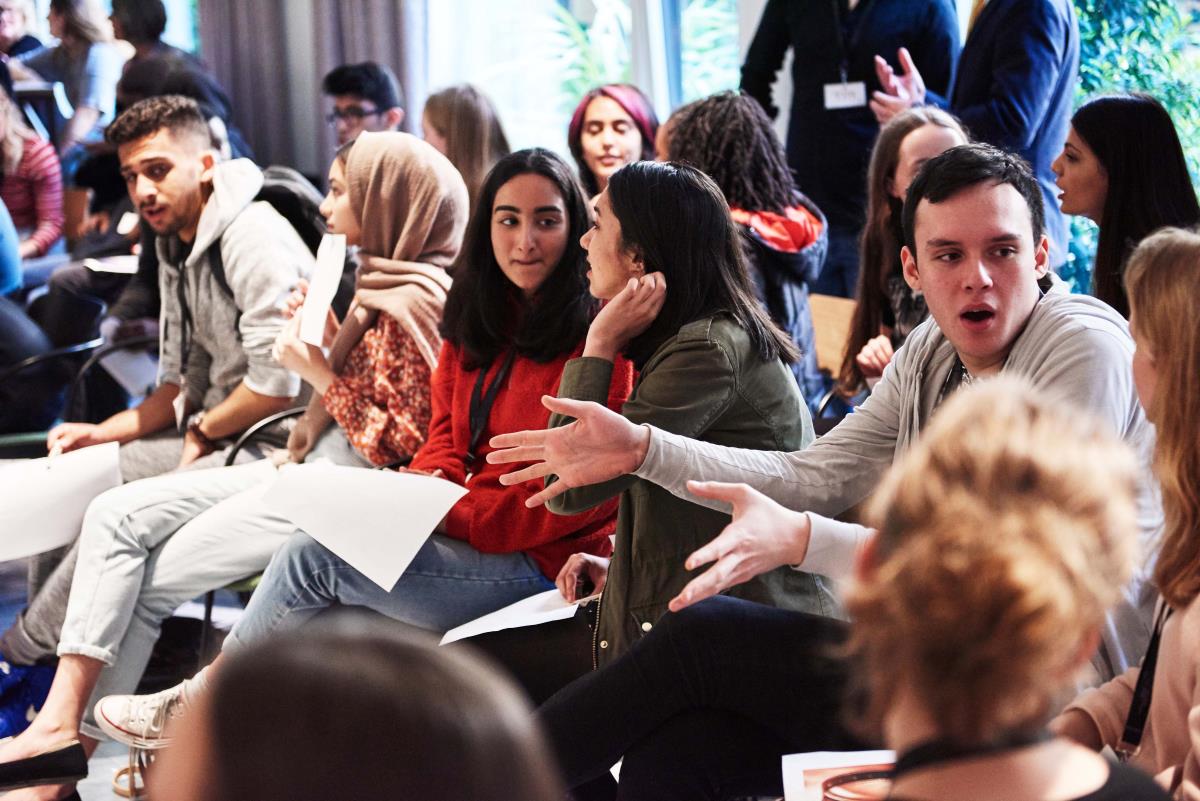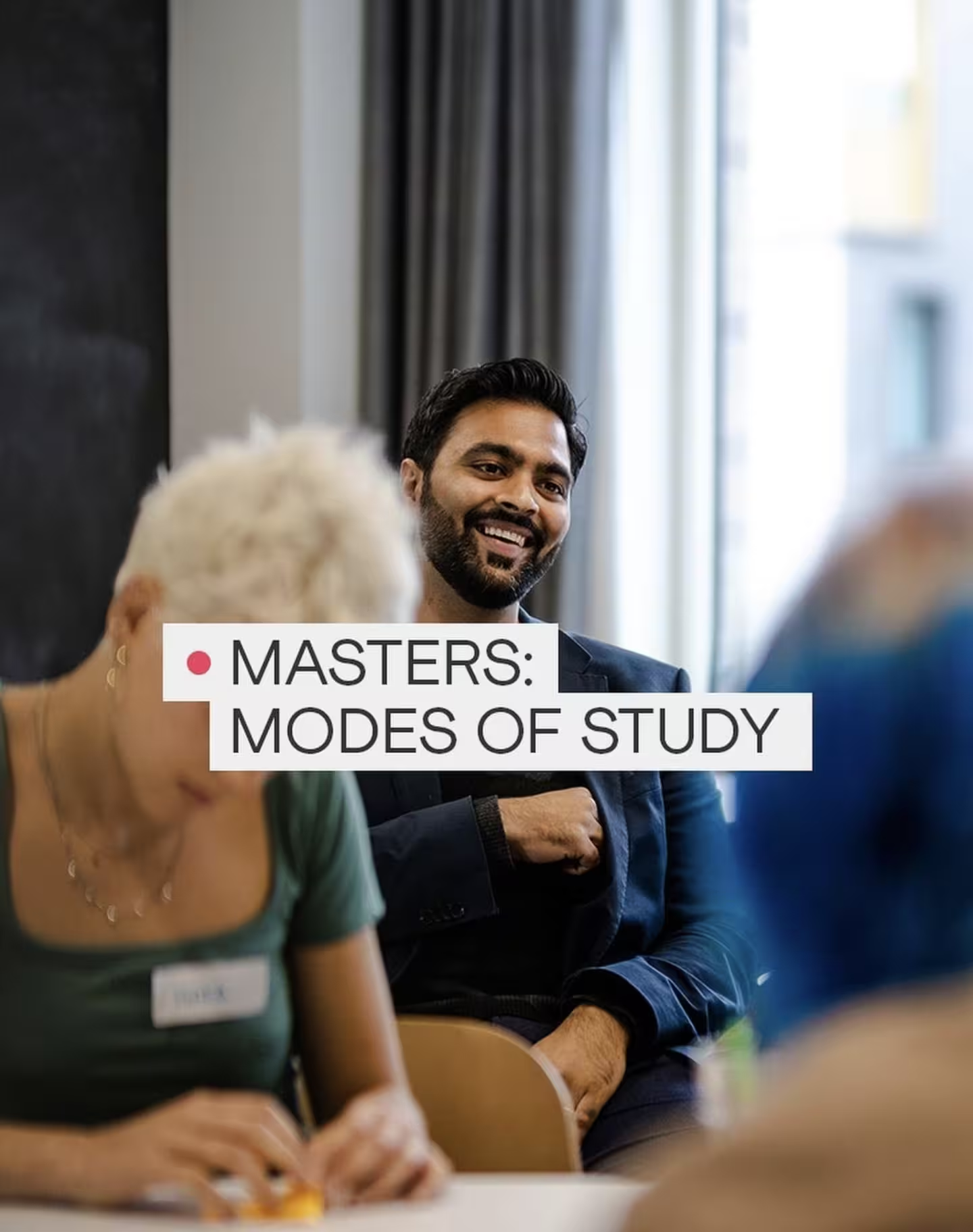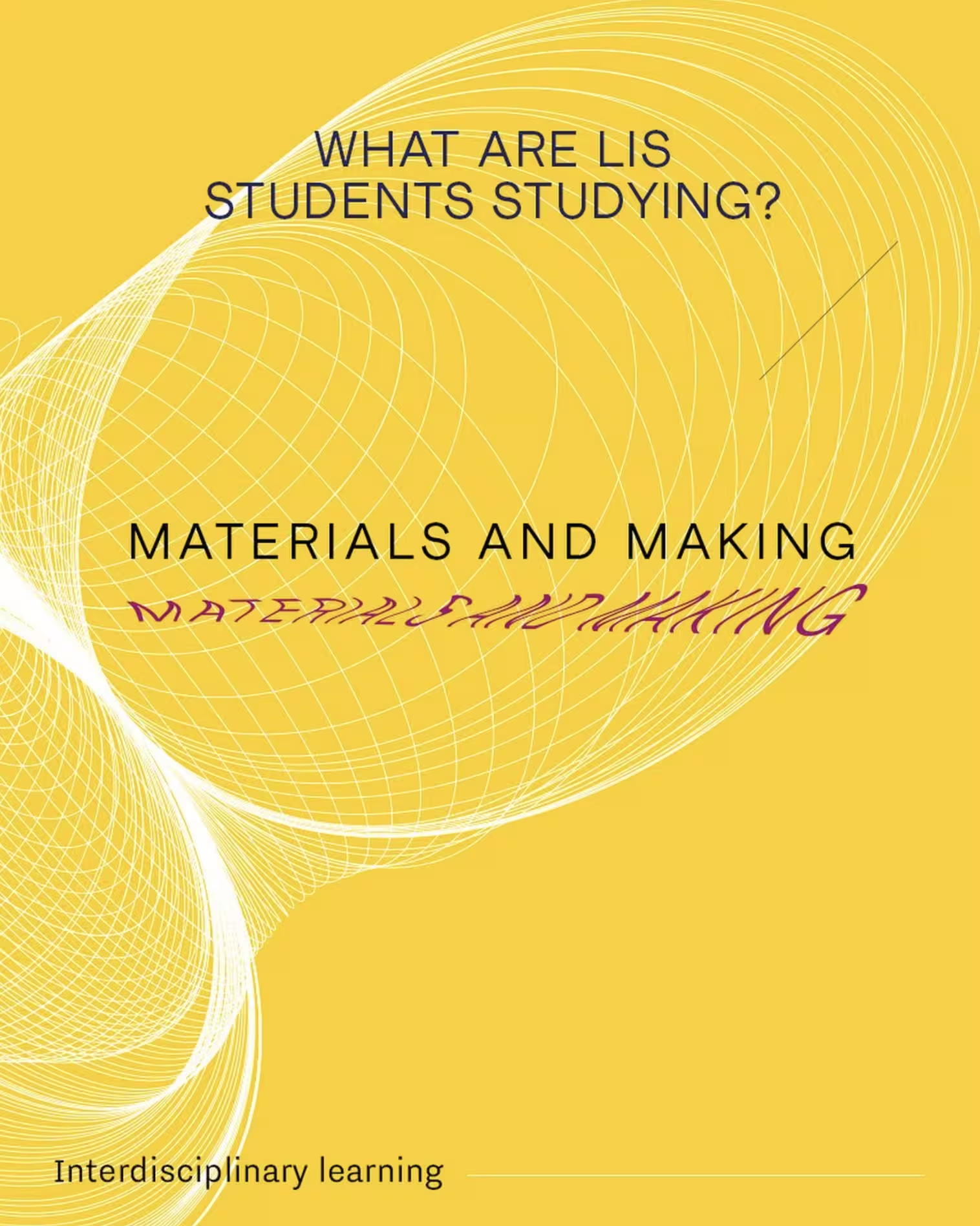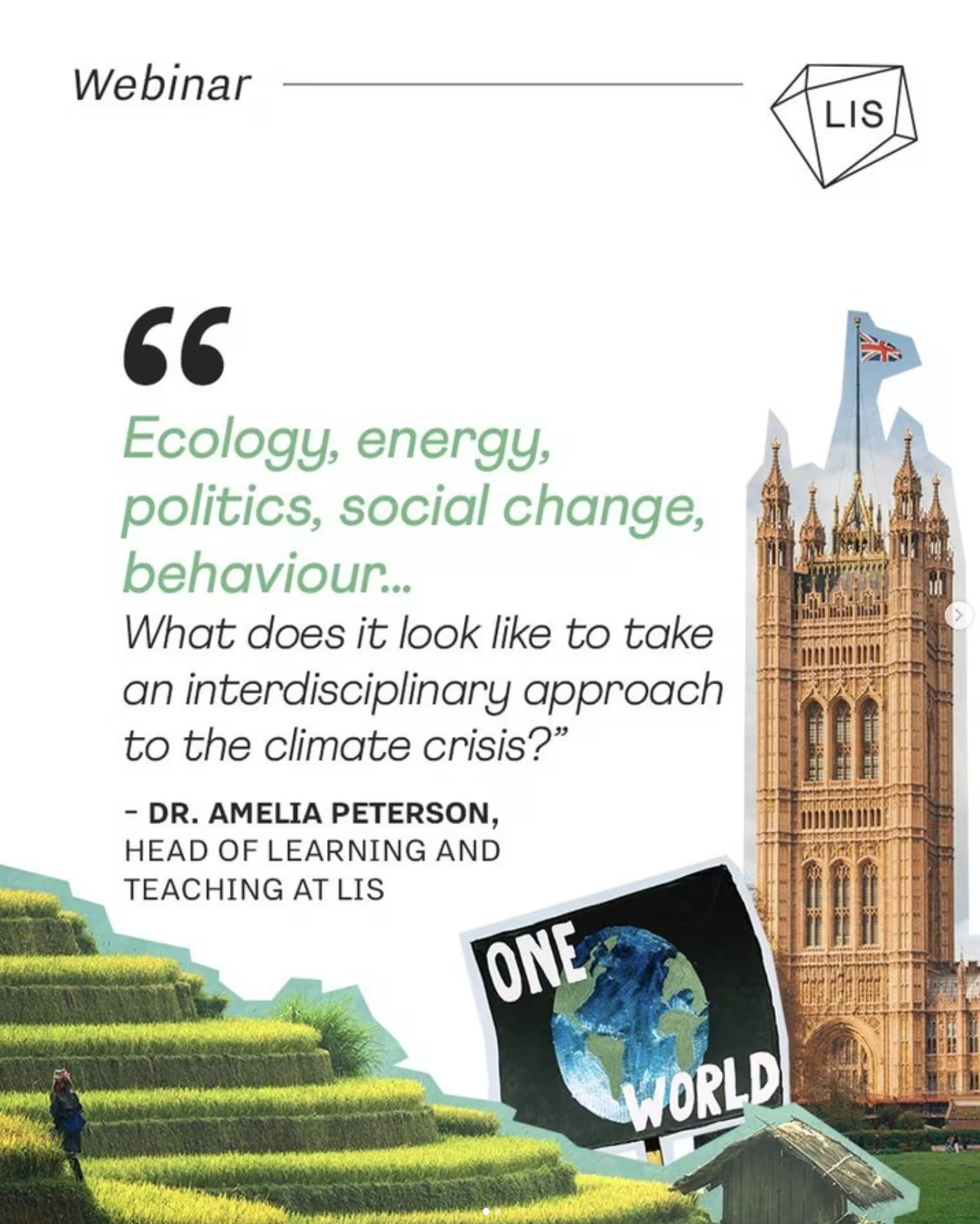Is LIS the right place for my child? An honest Q&A from a LIS student parent

What were three things that were important to you and your child when looking at universities?
They may have been different for Finn and me! For me, that there was adequate contact hours (friends had complained about some universities barely having any face to face teaching, and this was before covid); enthused students and interesting tutors at open days (who you could talk to); the ability to learn new things as well as deepen knowledge of already established interests.
When having a look at LIS curriculum, what stood out to you?
That it turned things upside down. That it had a problem-solving approach. That it was interdisciplinary. That it was trying to address shortcomings in our very specialist education system in terms of fostering curiosity for new intellectual pursuits and practical skills for life after university, particularly for those that don’t know what they want to do in life, and feel anxious about narrowing things down.
So far in your child’s journey, what do they think of it? (curriculum, course-work, community, the social side, living in London)
My son loves it. It helps that he had tried another interdisciplinary course out that turned out not to live up to the promise. It also helped he had pursued ‘wet lab’ science, something that LIS didn’t offer and which had worried him, but that experience had not enthused him they way he had thought it would, so he could put that to rest. He had always fostered a deep and supercurricular love of history, but also physics and chemistry, so has been torn between these two disciplines since GCSEs. This is why he did the IB and not A levels. He has just phoned to say he had one of the most interesting modules ever on supply chains (1) taught by a visiting lecturer, which he knew nothing about, and which frankly I isn’t something I would have picked out for him to have loved, so it says a lot of the calibre of that tutor.
He says the course is very hard work, but rewarding. Much harder work than the previous university, or his friends’ experiences in other universities. He is exhausted but was very touched by an email Carl sent out towards the end of the Autumn term saying that he knew how exhausted and ill everyone felt but to keep going, and they were doing really well.
His prior university experience has made him keenly aware of how incredibly responsive LIS can be for this founding cohort and how many contact hours they get this first year compared to other institutions.
He says the welfare help is very good, and that the disparate experience and specialsims of students bring a lot to the course, but is also the reason why some students feel they can’t manage – ie they see some students taking to programming relatively easily (perhaps with maths background?) and feeling, especially at first, that they will never be able to do it and becoming discouraged. He says they do help each other out, and it is obvious that they all bring something different but not everyone has the self confidence to realise that they too have strengths.
Socially he is very happy. He is student halls which helps. He tried some of the St Mary’s clubs but has dropped out. He does feel supported in starting new clubs, but the numbers are so small, though the climbing club has been fantastic.
What was the deciding factor which made your child want to come here? The moment it clicked that this was where they wanted to go.
Again, his experience is a bit different. He took part in an LIS online programme during lockdown which he said was ‘the best teaching he had ever had’. Sadly LIS did not open its doors when it had hoped, so he took a place elsewhere. He very clearly did not let it go though … his disappointment with the other institution meant that eventually he followed his heart and has not regretted it at all.
Was there something unique about LIS that you found other unis didn’t have? If so, what was it?
I find this a difficult question. Yes it clearly was a very different model of university, and that was exciting and worrying in equal measure for reasons I give above and below. I thought it wasn’t a university for everyone by any means, but the problem-solving/ interdisciplinary approach I thought might be exactly right for my son. I know that my son felt more like he belonged there then any other university we visited.
What were your concerns when your child was considering LIS? Have they changed?
That it was so small and new. That it might not have grown its reputation by the time he graduated to give him the chance to follow his dreams post university. That it was untried. I was worried about designing a degree around employability (the theme that LIS was set up in response to industry saying they weren’t getting the calibre of candidates for jobs they needed) instead of being a chance to really dig into something you loved.
Yes they have. I can see he loves it. I can see that he is gaining skills that his sister, an Oxford graduate, wishes she had now she is applying to masters. I think the internship scheme is amazing (not that he’s done that yet), but again it appears that this opportunity is extraordinary compared to other universities, and the fact it is paid addresses the very real advantage that students who can afford to take unpaid internships in the holidays have over those who have to work in the holidays to supplement their loans. I noticed in your literature that the programme seems to have been very successful from the employers’ standpoint too.
How does your child find living in London with the cost of living?
He finds it expensive, but is very frugal so is managing OK. He cooks with friends a lot rather than going out. He says the time that the course demands in prep, in person and in course work means that he simply could not work and do the course well and feels worried and sorry for those that are trying to do that. Living in halls helped him make a cohort of friends, and they seem to have found lots to do that is free or very cheap. He thinks that those who live at home, and commute in have a much lonelier time but understands why they have to do it. He says some students who applied for accommodation late, struggled to find anything. He hopes to rent a cheaper flat with friends next year, but finding accommodation in London that is affordable is an issue, so the student halls (Claredale) he is in are actually good value for money, and less expensive than some student halls in other less expensive cities. He purposefully chose halls that meant he could walk to uni to save on travel, which is also expensive.
What kind of conversations were you having with your child before you decided that LIS was the place for them?
We went through all the pros and cons. The main cons were how small it was and the fact it was new. I said he needed to do what felt right and that no one could make that decision for him but that I could really see why he liked it so much. I said that it was worth paying attention to how responsive and enthusiastic the staff were compared to some of the other places we’d been. I know that other universities make a big deal about their reputations, and place on the world rankings, but my lived experience is that matters much less than you think it does in life. My theory that it is detrimental to English kids to be given the ‘fear’ treatment from an early age in their academic career .. fear of failing, fear of not knowing the answer, fear of making the ‘wrong’ choice and I found it completely refreshing that LIS was the antithesis to all this and that I thought this model might erase some of that unhelpful thinking. However, he is a very different person from me, so he needed to be left to make this decision by himself.
How prepared do you think will your child come out of LIS when looking for a job?
I think that he has so many opportunities. Not just being an employee, but part of a start up or social enterprise, or a masters if he wants to carry on in academia. As I said my daughter has taught us that internships and data science skills are highly regarded. I think that he will show himself to be enormously well-rounded and skilled with a real understanding of how to be effective and supportive as part of a team. I don’t think he will be frightened of difficult problems, but know how to go about addressing them most effectively. I think he will be much more confident than he would have been if he had continued with his previous course.
Were you (are you) concerned about LIS’s sustainability?
Yes. I went to an open day and sat at the back, and waited til the whole thing was over and went and talked to one of the staff about that as I didn’t want to ask in front of all the students and embarrass my son. I was reassured that my son would graduate with a degree and that the university had to have the financial backing to sustain it before it would be allowed to open and that the process of approval was very rigorous. It also helped that it was being covered in mainstream press as an exciting venture.
What would you say to other parents whose child is thinking of applying to LIS?
I would say that LIS is a serious, dedicated and responsive university for people who are comfortable with breaking the mould. I think it suits people best who think they would like to move out of ‘their comfort zone’ and genuinely explore completely new areas of learning. If their child is unsure of what they would like to do and has always been curious and interested in lots of different things, LIS is a great place to take that further. I would say it is extremely hard work and a small community, which both will be challenging to some students. I would encourage them to have a gap year first because I think many students are quite burned out after sixth form and it definitely isn’t a doddle, so to come refreshed and ready to learn again, with all the confidence that a gap year can bring, and some savings to cushion you if possible, as London is expensive.
I would encourage their child to take the opportunity to talk to the current students about their experience before deciding and to go to as many open days as possible at various institutions to really see for themselves the difference. It is a unique opportunity in that they (the students) really can help shape this university’s success because the staff are open to listening to what works and what doesn’t, and have a very unusual rapport with students. That said, I also feel that is also a responsibility to live up to which they wouldn’t have at other institutions. Each student is shaping the LIS future reputation through their engagement in the course, attendance and participation in the projects. Every individual is genuinely important to the success of the whole, that’s a good life lesson too.
Many bigger, established universities response to students’ feedback is to do nothing at all because they have always done things that way, or the wheels move incredibly slowly. Many students are very dissatisfied with the actual experience compared to the marketed or reputational one. Talking to friends about their children’s experiences at other universities leave me far from convinced that the teaching is as good as the hype at many of them. There are some where students are basically still having an online experience even now. Finn was in physics ‘seminars’ of 60 plus students.
I hate talking about education in terms of value for money, but there is no doubt that LIS is fantastic in terms of teaching and contact hours compared to many, many others.
Share this story
Sign up for our newsletter
Don't miss out on important updates including course information, new announcements, Open Day dates and the latest LIS news.

.jpg)












































.svg)

.svg)









.webp)
This is a comment related to the post above. It was submitted in a form, formatted by Make, and then approved by an admin. After getting approved, it was sent to Webflow and stored in a rich text field.